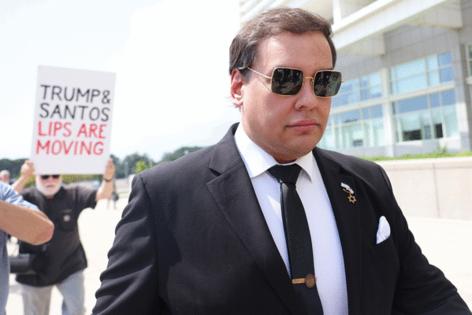Editorial: Trump's pardons reward lawlessness
Published in Op Eds
A glance at the George Santos case might suggest merely that the most flagrant liar in American politics simply couldn’t bear to see a fellow fabulist languish in prison.
But there’s a deeper, costlier moral rot in President Donald Trump’s decision to commute Santos’ sentence after less than three months of a seven-year term.
It’s of a pattern.
The President of the United States doesn’t believe in punishing financial crimes unless he can allege them against political foes like Letitia James, New York’s attorney general.
Victimizing the public
Trump’s pardons and commutations don’t just open cell doors or erase convictions. They’re costly to the public and to countless victims because they also erase court-ordered fines and restitution. And they subvert the bedrock principle that the laws apply to everyone.
The monetary debts Trump has forgiven amount to $100 million in fines and $1.3 billion in victim restitution, Forbes magazine reported.
Santos’ debts were relatively small: $374,000 to victims and $205,000 to taxpayers.
Though the fables that got him elected from Long Island were flagrant, such as being descended from Holocaust refugees, he wasn’t sentenced for lying to voters. If that were a crime, we’d need many more prisons.
A very rare expulsion
But lying to Congress is a crime. So are wire fraud and aggravated identity theft, to which Santos pleaded guilty. He repeatedly charged donors’ credit cards without authorization for money he spent on such non-political purposes as Botox, designer fashion and OnlyFans jollies.
Santos was so repulsive that 105 fellow Republicans joined 211 Democrats, making him only the sixth member ever expelled from Congress. (The first three were Confederate sympathizers.)
Santos isn’t worry-free yet. Presidents can’t pardon crimes against state laws. In New York, the Nassau County district attorney leaves little doubt that she’ll pursue Santos now that the federal government is done with him (and she should).
The audacity of Trump
The onetime congressman is small fry, however, in the constellation of offenders whom Trump has forgiven.
It expanded last week when he pardoned Changpeng Zhao, founder of the cryptocurrency exchange Binance, who served four months in prison on account of lax controls that allowed people in sanctioned countries and terrorist groups like Hamas to move money through his firm.
Among other things, the pardon could make it possible for him to take charge of his company again and help ease Binance into the U.S. market.
This offensively audacious pardon suggests grift on Trump’s part. That’s because, while Zhao was lobbying for it, Binance partnered with World Liberty Financial, a crypto company co-founded by the families of Trump and his Middle East envoy Zach Witkoff. That Zhao wasn’t managing the company at the time is a distinction without a difference.
Congress owns it, too
“If Congress does not stop this kind of corruption in pending market structure legislation, it owns this lawlessness,” Sen. Elizabeth Warren, D-Mass., said.
Trump is not the first president to indulge in dubious clemencies. Democrat Bill Clinton notoriously pardoned Marc Rich, a billionaire oil trader, while he was a fugitive from tax evasion, racketeering and other charges.
Clinton denied it was payback for donations by Rich’s ex-wife to his presidential library, but on reflection, he said later: “It wasn’t worth the damage to my reputation.”
Trump should care more about his.
Among his other indefensible pardons, most of which have skirted the Justice Department’s pardon office:
— Ross Ulbricht, founder of the Silk Road dark-web marketplace, convicted of conspiracy to distribute narcotics and money laundering, after serving 12 years of a double life sentence.
— Rod Blagojevich, the former Democratic governor of Illinois, serving 14 years for charges including an attempt to sell Barack Obama’s former Senate seat.
— Paul Walczak, a nursing home executive sentenced to 18 months for tax fraud and $4.4 million in restitution, the pardon coming three weeks after his mother attended a $1 million per person fundraiser for Trump.
— Devon Archer, a former business partner of President Biden’s son Hunter Biden (whom Biden himself had pardoned), convicted of defrauding a Native American tribe in a $60 million bond plot.
— And most infamously, on his first day back in office, Trump pardoned or commuted the sentences of some 1,500 people who had attacked the Capitol to try to keep him in office despite his 2020 election defeat.
Ignoring financial crimes
Trump has issued more than 70 pardons or commutations since pardoning the Jan. 6 mob. His indulgence for serious financial criminals is glaring.
Attorney General Pam Bondi, acting under his direction, directed the Justice Department to deemphasize financial crimes and limit enforcement of the law against bribing foreign officials and companies.
But no mortgage document is too small for Trump’s mob to prosecute if they can allege it against one of the people Trump craves vengeance for trying to hold him to account. The Letitia James prosecution is as blatant an insult to justice as Santos’ commutation.
It’s a demoralizing time for all conscientious career prosecutors, and for all law-abiding Americans. But if there’s such a thing as a good time to be a crook, this is it.
_____
©2025 South Florida Sun Sentinel. Visit at sun-sentinel.com. Distributed by Tribune Content Agency, LLC.
























































Comments